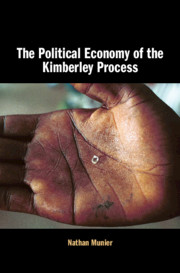Book contents
- The Political Economy of the Kimberley Process
- The Political Economy of the Kimberley Process
- Copyright page
- Contents
- Tables
- Acknowledgments
- 1 Diamonds after Blood?
- 2 The Domestic Political Economy of International Agreements
- 3 From Passiveness to the Presidency
- 4 Diamonds, Dependence, and De Beers
- 5 The One Who Controls the Diamond Wears the Crown
- 6 The Limits of Cooperation after Conflict?
- 7 No Private Companies = No Compliance
- 8 Understanding the Nature of the Kimberley Process and International Agreements
- Works Cited
- Index
2 - The Domestic Political Economy of International Agreements
Published online by Cambridge University Press: 20 August 2020
- The Political Economy of the Kimberley Process
- The Political Economy of the Kimberley Process
- Copyright page
- Contents
- Tables
- Acknowledgments
- 1 Diamonds after Blood?
- 2 The Domestic Political Economy of International Agreements
- 3 From Passiveness to the Presidency
- 4 Diamonds, Dependence, and De Beers
- 5 The One Who Controls the Diamond Wears the Crown
- 6 The Limits of Cooperation after Conflict?
- 7 No Private Companies = No Compliance
- 8 Understanding the Nature of the Kimberley Process and International Agreements
- Works Cited
- Index
Summary
This chapter outlines theories of compliance and cooperation with international regimes and discusses how these theories would predict state responses to the Kimberley Process. Next, the domestic political economy approach is defined, along with an explanation of why it has more potential to explain variation in compliance and cooperation in response to the Kimberley Process that applying past approaches would. Finally, three hypotheses, are presented: (1) The higher the level of government dependence on the private diamond industry, the more states will be inclined to accept the preferences of private economic actors that relate to compliance and cooperation with the Kimberley Process. (2) The higher the level of diamond dependence in a state, the greater the influence over the domestic political decision process held by private economic actors with preferences for complying and cooperating with the Kimberley Process, the higher the level of state compliance and cooperation with the Kimberley Process. (3) Countries that have alluvial diamond deposits will have a lower probability of complying/cooperating with Kimberley Process regulations than those that have primary deposits. The geographical distribution of alluvial diamonds matters, as in countries where they are more richly distributed compliance will be more difficult than those where they are located in a centralized area.
- Type
- Chapter
- Information
- The Political Economy of the Kimberley Process , pp. 29 - 59Publisher: Cambridge University PressPrint publication year: 2020



